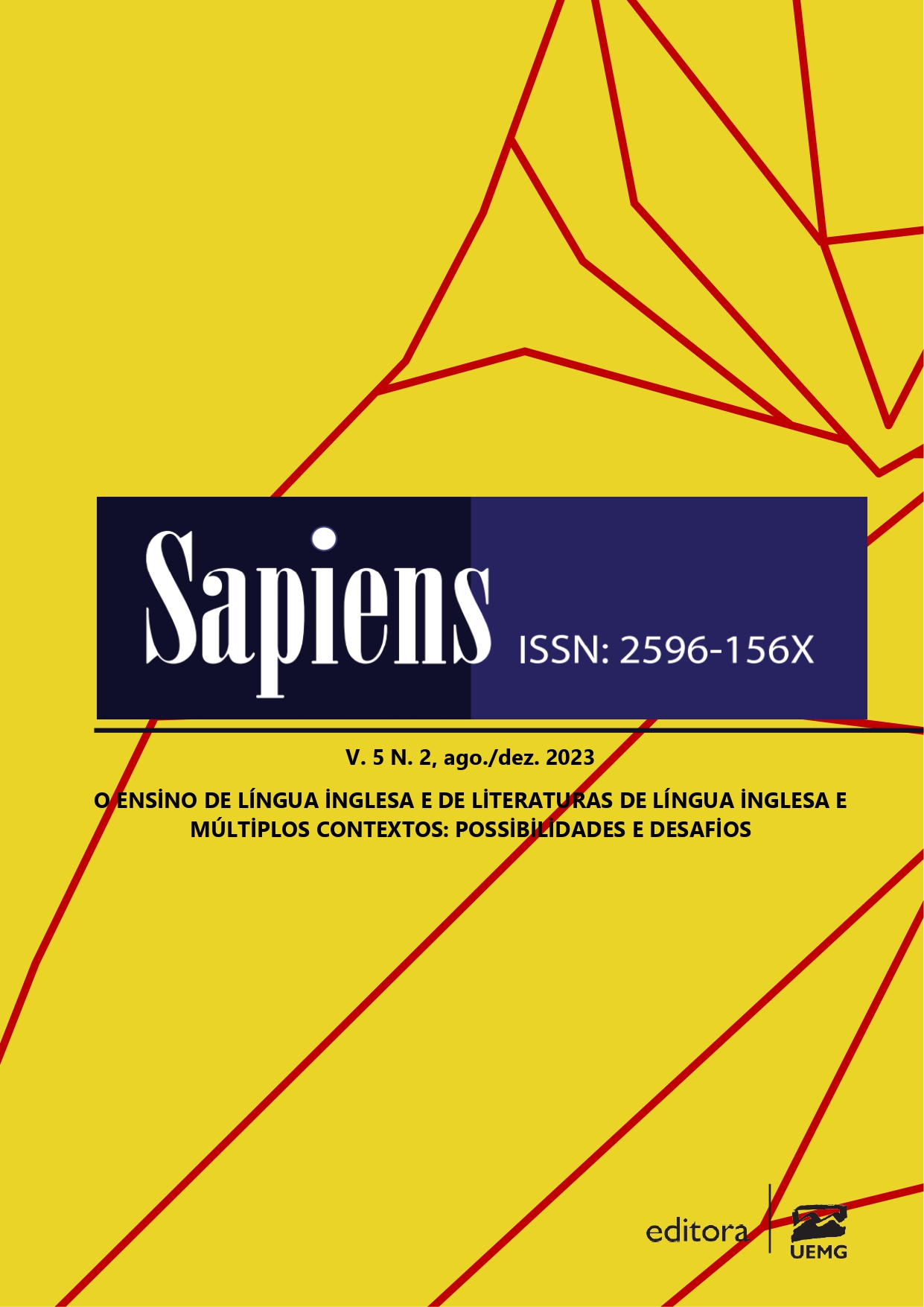HARRY POTTER’S MAGIC WORLD
A possibility for English learning though gamification
Keywords:
English Teaching, Second language learning, Gamification, Affective Filter, MotivationAbstract
Considering the English language importance in the globalized world, this research was carried out in order to develop new approaches in English teaching. The objective of this research was to show how it is possible to facilitate English teaching as a second language in schools through gamification. A game was developed based on the book Harry Potter and the Sorcerer's Stone. We discussed challenges of the second language acquisition and presented possible ways to facilitate it, such as some methods and approaches used by teachers and public-school student’s perspective on the pedagogical proposal. The concepts of Huizinga (2007) and Oliveira (2015) about games and their wide possibilities for teaching practice were discoursed through a literature review. Furthermore, the comprehensible input and Affective Filter hypothesis by Stephen Krashen (1981; 1982) and Gardner et al motivation theory (1972; 1976; 1985) were also discussed. The research was conducted under the qualitative and quantitative methods through the application of a didactic sequence for high school freshman students and also the application of questionnaires in order to verify the effectiveness of the student's motivation while learning English. The collected data indicate the need of implementing new approaches and they verify the effectiveness of keeping students motivated in order to facilitate the teaching-learning process.
References
ALBORNOZ, S. G. Jogo e trabalho: do homo ludens, de Johann Huizinga, ao ócio criativo, de Domenico De Masi. Cadernos de Psicologia Social do Trabalho - Departamento de Ciências Humanas da Universidade de Santa Cruz do Sul (UNISC), vol. 12, n. 1, pp. 75 -92, 2009. Disponível em: http://pepsic.bvsalud.org/pdf/cpst/v12n1/a07v12n1.pdf. Acesso em: 15/julho/2022.
ALVES, F. Gamification: como criar experiências de aprendizagem engajadoras: um guia completo do conceito à prática. São Paulo: DVS Editora, 2015.
BRASIL. Ministério da Educação. Base Nacional Comum Curricular. Brasília, 2018.
BRASILEIRO, A. M. M. Como produzir textos acadêmicos e científicos. São Paula: Contexto, 2021.
BRITISH COUNCIL. O Ensino de Inglês na Educação Pública Brasileira. São Paulo, 2015. Disponível em: https://www.britishcouncil.org.br/sites/default/files/estudo_oensinodoinglesnaed ucacaopublicabrasileira.pdf. Acesso em 02 de maio de 2022.
CHEN, I. J. (2005). Using Games to Promote Communicative Kills in Language Learning. The Internet TESL Journal, 11(2). Disponível em http://iteslj.org/Techniques/Chen-Games.html. Acesso em 27 de jul. 2021.
COOK, V. Second language learning and language teaching. London: Edward Arnold, 1991.
DUCROT, O. A pragmática e o estudo semântico da língua. Letras de Hoje, Porto Alegre. V. 40, nº 1, p. 9-21, março 2005
FIGUEIREDO, F, J. Q. Aquisição e Aprendizagem de Segunda Língua. In: Revista Signótica 7, Goiânia: Ed.da UFG, Jan – Dez, 1995.
GARDNER, R. C. Social Psychology and Second Language Learning. London: Edward Arnold, 1985.
GARDNER, R. C.; LALONDE, R. N. Second Language Acquisiton: A social psychological perspective. Los Angeles, 1985.
GARDNER, R. C., & Lambert, W. E. (1972). Attitudes and Motivation in Second Language Learning. Rowley, MA: Newbury House Publishers.
GARDNER, R. C., Smythe, P. C., Clément, R., & Gliksman, L. (1976). Second- language learning: A social psychological perspective. Canadian Modern Language Review, v: 32(3), p. 198-213, 1976. doi: https://doi.org/10.3138/cmlr.32.3.198
GRUBITS, S; NORIEGA, J. A. V. Método Qualitativo: epistemologia, complementaridades e campos de aplicação. São Paulo: Vetor, 2004.
HUIZINGA, J. Homo ludens: o jogo como elemento da cultura. Tradução: João Paulo Monteiro. São Paulo: Perspectiva, 2007.
HONG, L. (2002). Using games in teaching English to young learners. The Internet TESL Journal, 8(8). Disponível em:
http://iteslj.org/Lessons/Lin-UsingGames.html. Acesso em 20 jul. 2021
KLIMOVA, B. F. Games in the Teaching of English. Procedia - Social and Behavioral Sciences, Amsterdam, v. 191, p. 1157-1160, 2 jul. 2015. DOI https://doi.org/10.1016/j.sbspro.2015.04.312. Disponível em: https://www.sciencedirect.com/science/article/pii/S1877042815025720. Acesso em: 20 jul. 2021.
KOCH, I. V. O texto e a construção do sentido. São Paulo: Contexto, 1997.
KRASHEN, S. D. Principles and Practice in Second Language Acquisition. Pergamon Press Inc. First printed edition, 1982. First Internet edition, 2009. Disponível em http:// http://www.sdkrashen.com/content/books/principles_and_practice.pdf. Acesso em 27 de dezembro de 2020.
KRASHEN, S. D. Second Language Acquisition and Second Language Learning. California: University of Southern California. First printed edition 1981 by Pergamon Press Inc. First internet edition December 2002.
KRASHEN, S. D. Applying the Comprehension Hypothesis: Some Suggestions. International Journal of Language Teaching, v. 1, p. 21-29, 2004. Disponível em http://www.sdkrashen.com/content/articles/eta_paper.pdf. Acesso em 20 fev.
LAKOMY, A. M. Teorias cognitivas da aprendizagem [livro eletrônico]. Curitiba: InterSaberes, 2014. (Série Construção Histórica da Educação). Disponível em: https://plataforma.bvirtual.com.br/Leitor/Publicacao/12874/pdf/0code=OY4GBy5 TJfxAV1t0r9qKAwyOL8D2nFPZIxn8iA+fpDaQYireMY2VVEjZgxR0ttAekWBEw2 SOwZ31q97Fy8FV mg==. Acesso em: 07 abr. 2021.
LEAL. D. e NOGUEIRA. M. O. G. Dificuldades de aprendizagem – um olhar psicopedagógico. Curitiba – PR: Ibpex. 2011.
LIBERALI, F. C. A BNCC e a elaboração de currículos para Educação Bilíngue. In: MEGALE, A. Educação Bilíngue no Brasil. São Paulo: Fundação Santillana, 2019.
LITTLEWOOD, W. Communicative language teaching. Cambridge: Cambridge University Press, 1995.
MARCUSCHI, L. A. Produção textual, análise de gêneros e compreensão. São Paulo: Cortez, 2008.
MCGONIGAL, J. Realidade em jogo: por que os games nos tornam melhores e como eles podem mudar o mundo. Rio de Janeiro: Best Seller, 2012.
NASCIMENTO, C. E. R. O jogo na aula de língua estrangeira: espaço aberto para
manifestação do eu. Alfa (ILCSE/UNESP), v. 52, p. 149-156, 2008.
OLIVEIRA, A. C. Gamificação na Educação. Obra Digital, (9), p. 120–125, 2015. https://doi.org/10.25029/od.2015.82.9
OLIVEIRA, L. A. Métodos de ensino de inglês teorias, práticas, ideologias. São Paulo Parábola Editorial, 2014.
OLIVEIRA, L. A. Aula de inglês: do planejamento à avaliação. São Paulo: Parábola Editorial, 2015.
SCHNEUWLY, B. e DOLZ, J. Gêneros orais e escritos na escola. Tradução por: Roxane Rojo e Glais Sales Cordeiro. Campinas: Mercado de Letras, 2004.
THORNBURY, S. How to Teach Grammar. Essex: Pearson Education Limited, 1999.
UBERMAN, A. The use of games for vocabulary presentation and revision. English Teaching Forum, 36(1), 20-27, 1998.



